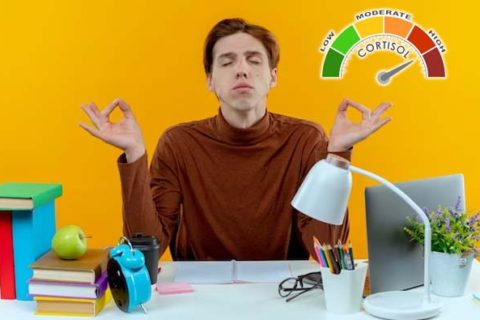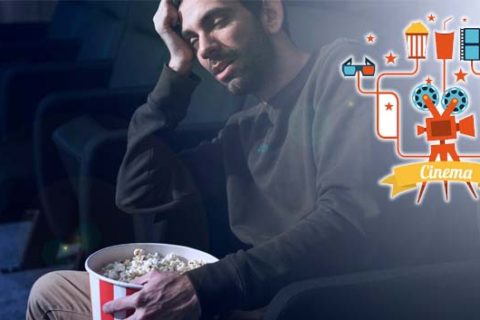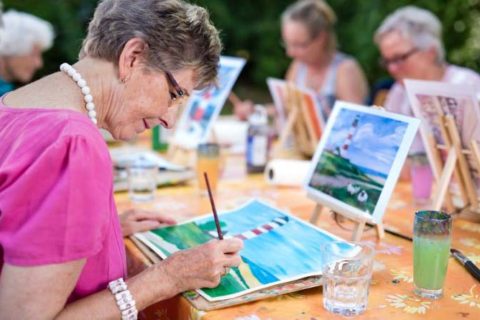Do you have a panic disorder? According to The National Institute of Mental Health Information Resource Center as also explained on the Kampus Psikologi site, people with panic disorder have repeated and sudden panic attacks and it happens for a few minutes or more. If you have a panic disorder and you often have panic attacks at home, you need to know how to relieve it.
According to the Anxiety and Depression Association of America as also explained on the Kampus Psikologi site, panic disorder often happens in the late adolescent phase or early adult phase at 18 years old to 25 years old.
Do you want to know more about panic attacks? If so, you are able to read the explanation below according to the Kampus Psikologi site from an article written by Miftahun Fadhila, S.Psi where the reference of the article is from Calm Clinic site from an article written by Micah Abrahan, BSc entitled Home Remedies for Panic Attacks. The explanation includes the cause of panic disorder, how to relieve panic attacks, the alternative ways to relieve panic attacks at home, and how to stop panic attacks.
The Causes of Panic Disorder
1. Genetic
It is not clear about the cause of panic disorder, but some researches showed that panic disorder may happen to be related to genetics. So, sometimes panic disorder happens in a family, but no one knows why some family members have it while some others do not.
2. Life Transition
Another cause is related to significant transition which happens in someone’s life, for example, getting married, leaving college, or having a first child where all of these phases are main life transitions and these can make people stressed and lead to panic disorder.
It is difficult to cure panic attacks without help from outside parties. The reason is because one of the general problems in handling panic is the more you think about the panic attack, the more likely you are to experience it.
Even though handling a panic attack which happens at home is difficult, it does not mean that it is impossible. As you are able to read below, there are some alternative ways to relieve your panic and anxiety.
How to Relieve Panic Attack
Panic attack is complex and one of the things that makes it more complex is that panic attack is often reactionary in nature and it happens more often if the more you think about it and the more you worry about it.
Panic attack usually happens because of excessive sensitivity towards your feelings in a pattern like this:
- You live your life worrying about panic attacks.
- You feel anything such as increased heart rate or mild discomfort.
- You are always aware of it because panic attacks make you too sensitive to it.
- And then, you are worried or sure that you will get a panic attack.
- This worry overwhelms your body with anxiety.
- You have a panic attack.
Excessive sensitivity is known as hypersensitive and it is a very common condition which happens to those with anxiety and panic attacks.
So, basically, you become too used to your body because you always worry about another panic attack and it makes you notice every change that your body is going through, which overwhelms you with anxiety because you worry it could mean another panic attack. Besides, the anxiety because of worrying about a panic attack can cause an increase in heart rate which can be the sensation that triggers the attack.
This is one of the main reasons why panic attacks can be very difficult to cure on your own. In many ways, panic attacks are self-inflicted. The more you think about it, fear, and in some cases try to treat the panic attack, the more likely you are to have the panic attack.
Alternative Ways to Relieve Panic Attack at Home
If you want to consult a professional for treatment of your panic attacks, you can do it. There are also some ways to relieve panic attacks which have been proved to be able to reduce the frequency and the severity of your panic attacks and even there are some home remedies below that can work better.
You also should always visit your doctor before you start any panic attack medication because it can reduce some of this anxiety. However, you have to be careful that there are a lot of people who still believe that the doctor misses something, so don’t expect a visit to the doctor to take all your worries away.
Note that not all home remedies for calming panic attacks are perfect. Some of them only can reduce the severity or frequency, but if your panic attacks are not too severe, you will be less afraid if it happens, you will be less prone to panic attacks in the future.
So, here are several effective ways to relieve panic attacks at home.
-
Breathing Retraining
The first thing that you have to do is to retrain your body to breathe in a more efficient way and to learn how your breathing influences panic attacks.
A number of researches show that most panic attacks symptoms do not originate from adrenaline rush, but from hyperventilation. What is hyperventilation? It is when your body releases too much carbon dioxide. Usually, it happens because you are breathing too fast, but in some cases, it can happen because you are inhaling too much oxygen.
There are a lot of people who are having panic attacks who are breathing fast because they are panicking or trying to take deep breaths because they feel that they need to. The thing that makes it worse is one of the hyperventilation symptoms namely feeling like you cannot get enough oxygen. It causes you to naturally want to breathe more and unfortunately it exacerbates hyperventilation. There are also the other hyperventilation symptoms that play important roles in panic attacks such as:
- Chest pain
- Light headache
- Hard to breathe
- Weak muscles and tingling
- Hard to concentrate
- Rapid heartbeat
If you are having panic attacks with these symptoms, you have to control and prevent hyperventilation by doing two ways below.
- Breathe More Slowly
When you feel that you are about to have a panic attack, you have to train yourself to slow down your breathing. Inhale for at least 5 seconds, hold for 2 or 3 seconds and then exhale for at least 7 seconds. You have to make sure that you inhale through your nose and exhale through your nose or your pursed lips like you are whistling. It does not mean that it can prevent panic attacks, but it will make it easier. - Retrain
You have to practice this breathing method even when you are not having a panic attack. For your information, panic attack and anxiety make your body out of its normal breathing pattern. You can take your time for 30 minutes every day to practice this breathing type so that it can help your body to learn again about how to breathe this way and reduce the possibility of hyperventilation in the future.
When you are having anxiety and panic attacks, your body will undergo the process of breathing habituation so badly that you experience hyperventilation. It causes panic attack -like symptoms and then it can trigger the real panic attack. So, it is important for you to teach yourself about how to breathe better.
-
Desensitization
What is desensitization? It is the process of making your panic attack less scary by experiencing it again and again until your body no longer finds panic attacks which cause so much anxiety.
For example, the most common triggers for panic attacks are dizziness, being hard to breathe, and being in a car. You can desensitize yourself to the panic attacks by using some of these variations:
- Dizzy
You are able to spin around in the chair and then wait until you calm down. - Hard to breath
Try hyperventilating on purpose. - Be in a car
You can drive for hours in a safe environment until you feel calmer.
You are able to combine these with some types of relaxation exercise to ensure that you do not run into too much anxiety when you try it. Also, you need to commit to it. Let’s say that you really have a panic attack while you are trying this desensitization technique and you let the attack stop you from going forward. If so, you are able to increase the possibility of the trigger that will cause a future panic attack. So, it is important for you to do these exercises in front of a professional.
However, there are a lot of people who can control the triggers of panic attacks with this system. If you are sure about your ability to commit, you are able to try it.
-
Exercising
There are some people who experience anxiety and panic attacks because of exercise. Nevertheless, some other people find that exercise can control anxiety symptoms permanently.
There are a number of benefits from exercise for anxiety as you are able to read below.
- It can reduce excessive muscle and mental energy.
- It can release endorphins that relax your mind and body.
- It can promote better sleep.
- It can increase hormone regulation and can burn stress hormones.
- It can help your breathing improve.
These are all the important strategies for controlling anxiety. There is some evidence that one of the main causes of panic attacks and anxiety is a lack of exercise. So, you have to consider exercising routinely.
Another Note to Control Panic Attack at Home
The strategies explained above are just the beginning. You also have to make a lot of life changes which do not encourage panic attacks.
One of the life changes that you can do is how you adapt with panic disorder. You have to remember that the fear of having a panic attack can increase the severity of the panic attack itself. It means that sometimes the best thing to handle it is to face your fear and let the panic attack occur.
If you have a panic attack when you are about to go to the mall, you have to make sure that you continue to go to the mall so that your panic attack does not control your emotion in making decisions.
It is also important for you to reduce the stress around you. You have to spend more time with friends and family to do fun activities so that you will not focus too much on your own panic attack. Also, you need to learn how to distract yourself when you feel a panic attack coming.
How to Stop Panic Attack
If you want to stop panic attacks, you need a lot of commitments and smart options. These involve learning more about your anxiety and it involves getting better understanding about what you can do to permanently reduce anxiety and panic forever.

A bookworm and researcher especially related to law and citizenship education. I spend time every day in front of the internet and the campus library.





